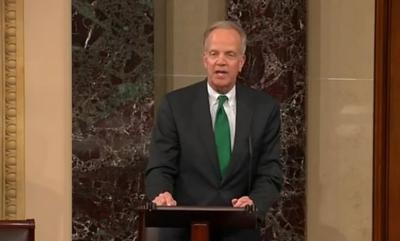Would Remove The Disincentive For Retired FAA Air Traffic Controllers To Work At Federal Contract Towers
US Senators Jim Inhofe (R-Okla.), Patty Murray (D-Wash.) and Jerry Moran (R-Kan.) led 39 of their Senate colleagues in re-introducing S. 419, the Continuity for Operators with Necessary Training Required for ATC Contract Towers (CONTRACT) Act of 2021.

There are 257 air traffic control facilities participating in the FAA’s Federal Contract Tower Program. These contract towers are an important part of our national air traffic control system—serving communities through a proven public-private partnership that increases safety and improves air traffic control services, while lowering the cost to the federal government. Reps. Julia Brownley (D-CA) and Rodney Davis (R-IL) re-introduced companion legislation in the House of Representatives.
Federal contract towers face a unique hurdle to hiring trained and well-qualified retired FAA controllers. Because FAA air traffic controllers are one of several federal employee groups whose retirement is mandated at 56 years of age, retired FAA controllers are penalized for continuing to work as controllers at federal contract towers. These experienced retired FAA employees should have the opportunity to use their skills at a federal contract tower without facing a financial penalty. This legislation would eliminate that penalty.

“Fully-staffed contract air traffic control towers are vital to maintaining the safety of our national airspace system—and former FAA controllers should be able to work in contract towers without facing a financial penalty,” Inhofe said. “We should be growing our aviation workforce, not thwarting it. With the introduction of the CONTRACT Act, we have the opportunity to ensure these important facilities, including the six contract towers in my state of Oklahoma, are fully-staffed with the most qualified, trained individuals available.”
“Contract air traffic control towers are an essential part of ensuring safe air travel in Washington state and across our country,” said Murray. “We need to make sure they are staffed with the most qualified individuals to help keep our skies safe, which is why I’m proud to join my colleagues in introducing this commonsense bill to remove unnecessary staffing barriers and help our air traffic control towers in Spokane and across Washington state attract the most experienced controllers.”
“Regional economies across Kansas rely on the aviation industry and our state’s eight contract towers, which play an important role in making certain air travel is safe,” said Moran. “This legislation removes an unnecessary hiring barrier and financial disincentive for air traffic controllers who have retired from the FAA, providing a simple and sensible solution to ensuring we have highly-skilled and experienced controllers working at federal contract towers and keeping skies safe across the country.”
“Ventura County airports play a key role in our region’s economy. Keeping all of our air traffic control towers open and fully staffed is critical for safety and helps our airports serve businesses and aviation enthusiasts in our region,” Brownley said. “This bill will ensure that FAA air traffic controllers, who choose to continue to work after the mandatory FAA retirement age of 56, can help us meet staffing needs at contract towers without losing their hard-earned retirement benefits. I want to thank Congressman Davis for co-authoring this important bill, and I look forward to working with our Senate colleagues, including Senators Jim Inhofe, Jerry Moran, and Patty Murray, to move the bill through the legislative process.”

“Small airports across the nation use contract towers to keep our airways safe, but are facing difficulties recruiting and retaining air traffic controllers,” said Davis. “This legislation will address this problem by allowing retired controllers to receive their full Social Security annuity payment while working at contract towers. Ensuring contract towers are adequately staffed is critical to their ability to maintain safety and continue operations. Additionally, these rural and suburban airports are often integral parts of the local economy and any reduction in controller capacity could have a negative economic impact.”
The CONTRACT Act is strongly supported by impacted stakeholders. The U.S. Contract Tower Association (USCTA), the American Association of Airport Executives (AAAE), the National Air Traffic Controllers Association (NATCA), the Oklahoma Aeronautics Commission and the six contract towers in the State of Oklahoma sent letters of support which can be viewed here and here.
Contract towers play a central role in managing the safety and efficiency of our nation's complex airspace, supporting general aviation safety, the efficiency of large commercial airports, disaster relief and emergency medical operations, law enforcement and agriculture activities and businesses throughout the United States. In addition, many contract tower airports are located near or adjacent to military bases and manage a substantial number of military-related and national security operations, directly supporting the readiness and training of military units.
This legislation would remove the disincentive for retired FAA air traffic controllers to work at federal contract towers. Under current law, FAA air traffic controllers must retire by age 56. Because this is earlier than the normal retirement age, controllers are included as a "special group" under the Federal Employees' Retirement System (FERS) and contribute an additional 0.5 percent of their annual salary into a special retirement annuity account. In return, they receive a FERS annuity payment during the mandatory retirement period between 56 and the social security minimum age of 62. The retired controller's special annuity payment is incrementally reduced if they earn more than the social security earnings limit of $17,640 (2019 tax year) annually. This annuity offset penalty results in many retired FAA controllers making the decision to not work as federal contract tower air traffic controllers.
 SpaceX to Launch Inversion RAY Reentry Vehicle in Fall
SpaceX to Launch Inversion RAY Reentry Vehicle in Fall Aero-News: Quote of the Day (04.23.24)
Aero-News: Quote of the Day (04.23.24) Aero-News: Quote of the Day (04.20.24)
Aero-News: Quote of the Day (04.20.24) ANN's Daily Aero-Linx (04.20.24)
ANN's Daily Aero-Linx (04.20.24) Aero-News: Quote of the Day (04.21.24)
Aero-News: Quote of the Day (04.21.24)





